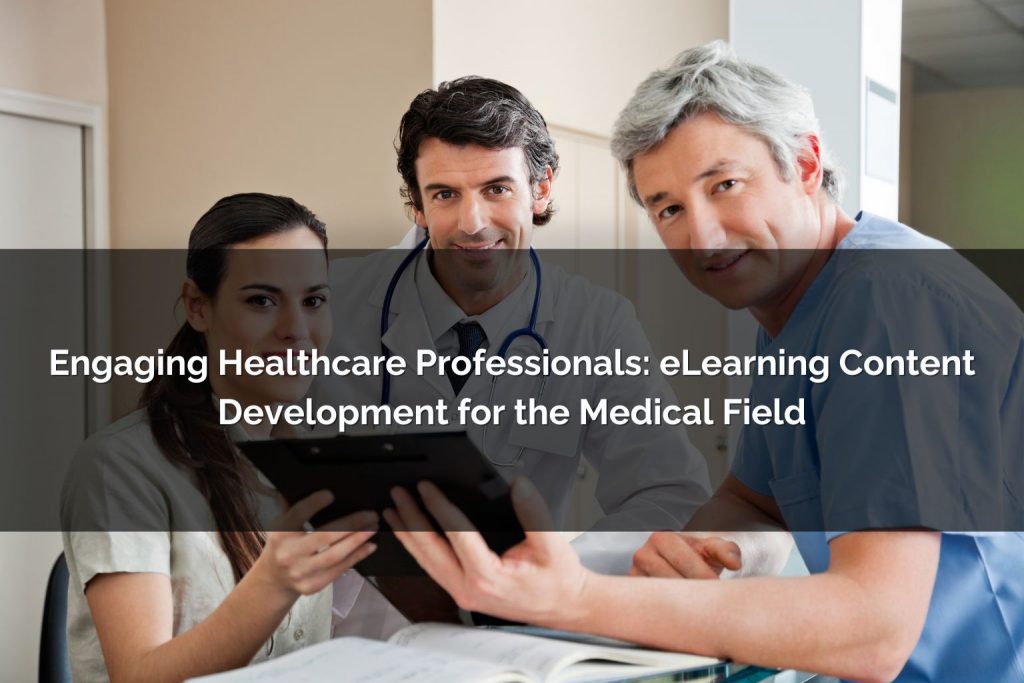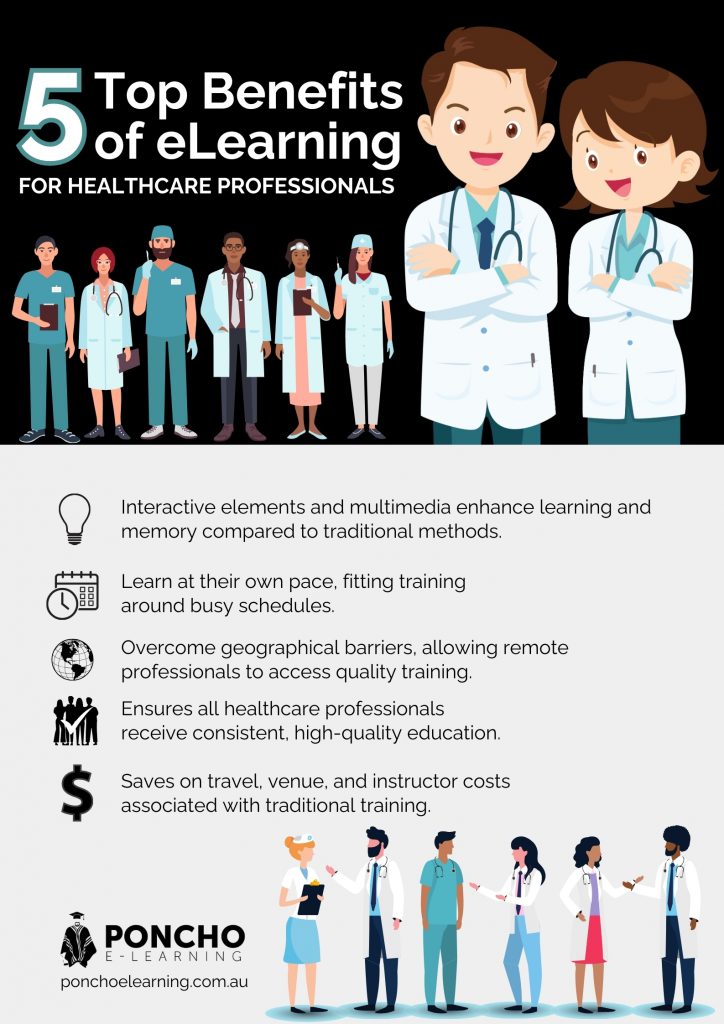The medical field is constantly evolving, with new research, technologies, and best practices emerging at a rapid pace. Healthcare professionals (HCPs) face the ongoing challenge of keeping their knowledge and skills up-to-date to ensure they provide the best possible care for their patients.

eLearning content development for the medical field offers a flexible and effective solution for HCPs to address this challenge. This article explores how eLearning content development can be utilised to engage healthcare professionals and empower them with the knowledge and skills they need to thrive in the ever-changing healthcare landscape.
What is eLearning Content Development for the Medical Field?
eLearning content development for the medical field involves creating engaging and interactive online learning experiences specifically tailored to the needs of HCPs. This can encompass various formats, including:
- Interactive modules: Combine text, images, videos, and quizzes to create engaging learning experiences.
- Microlearning: Deliver bite-sized learning modules on specific topics, ideal for busy schedules.
- Video tutorials: Demonstrate medical procedures and techniques visually.
- Case studies: Present real-world scenarios to facilitate clinical reasoning and decision-making skills.
- Simulations: Provide realistic and interactive learning environments for practicing skills and procedures.
By leveraging these diverse formats, healthcare organisations and educational institutions can create eLearning content development for the medical field, which is:
- Accessible: Allows HCPs to learn at their own pace and convenience, anytime, anywhere.
- Engaging: Uses interactive elements and multimedia content to keep learners motivated and focused.
- Effective: Promotes knowledge retention and skill development through diverse learning methods.
- Cost-effective: Offers a scalable and cost-efficient way to deliver training to a large workforce.
Benefits of eLearning Content Development for Healthcare Professionals

eLearning content development for the medical field offers numerous advantages for HCPs, including:
- Improved knowledge retention: Engaging and interactive learning methods enhance knowledge retention and application compared to traditional didactic lectures.
- Flexibility: HCPs can access training modules and complete coursework at their own pace and convenience, fitting it around their busy schedules.
- Accessibility: eLearning eliminates geographical barriers, allowing HCPs in remote locations to access quality training opportunities.
- Standardised training: eLearning ensures consistency in training content delivery, ensuring all HCPs receive the same high-quality education.
- Cost-effectiveness: eLearning eliminates travel and venue costs associated with traditional training, offering a more cost-effective solution for both individuals and organisations.
Key Considerations for eLearning Content Development in Healthcare
Developing successful eLearning content development for the medical field requires careful planning and attention to detail. Unlocking successful eLearning in the medical field requires careful attention to these key considerations:
- Identify learning needs: Conduct needs assessments to determine the specific knowledge and skill gaps among healthcare professionals.
- Target the right audience: Tailor the content to the specific needs and learning styles of the target audience, considering factors like experience level and specialty.
- Set clear learning objectives: Define what you want learners to achieve by the end of the training program.
- Choose the right format: Select the most suitable format (e.g., modules, simulations, case studies) based on the learning objectives and content complexity.
- Ensure accuracy and credibility: Collaborate with subject matter experts and follow best practices to ensure the content is accurate, up-to-date, and evidence-based.
- Focus on engagement: Incorporate interactive elements, multimedia content, and real-world scenarios to make the learning experience engaging and foster active learning.
Examples of eLearning Content for Healthcare Professionals
Here are some examples of eLearning content development for the medical field that can be implemented:
1. New drug administration guidelines
Interactive modules with case studies can educate HCPs on new medication administration protocols and potential side effects.
2. Advanced life support (ALS) training
Interactive simulations can provide HCPs with realistic practice opportunities for managing critical patient situations.
3. Mental health awareness
Modules with video lectures and case studies can raise awareness about mental health conditions and equip HCPs with effective communication and support strategies.
4. Ethical considerations in healthcare
Interactive modules and case studies can foster discussions and critical thinking around ethical dilemmas HCPs may encounter.
5. Soft skills development
eLearning modules can enhance communication skills, conflict resolution techniques, and teamwork strategies, fostering a positive work environment and improved collaboration within healthcare teams.
Embracing Continuous Learning with eLearning Content Development for the Medical Field
By leveraging eLearning content development for the medical field, healthcare organisations and educational institutions can empower HCPs with the knowledge and skills needed to deliver high-quality patient care in a rapidly evolving healthcare environment.
By incorporating the key considerations and examples outlined above, you can create engaging and effective eLearning content development.




